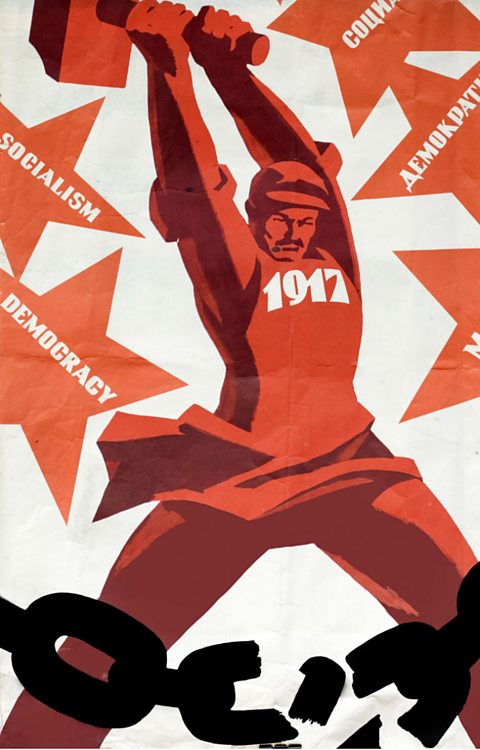Class in Animal Farm

Before the Revolution of 1917, Tsar Nicholas II ruled Russia. The ruling classes had money and power, whilst most of the population were poor, exploited peasant workers or from the working class. These people lived in terrible conditions and what they farmed was taken from them leaving them to face starvation and poverty.
The Revolution that came in 1917 sought to overthrow the Tsar and change the balance of society to give power back to the working class. The plot of Animal Farm closely parallels these events.
In Animal Farm, Orwell uses the animals to highlight the hardships of the working classes. He uses Mr Jones as a symbol for the Emperor - to highlight how lazy and neglectful the Tsar was. The animals each represent a different section of society at the time - they are a metaphorA comparison made without using 'like' or 'as', eg 'sea of troubles' and 'drowning in debt'. for what happened to the people.
The animals, like the working class of Russia, had short, difficult lives, working to produce things that the ruling class would take for themselves. The Rebellion on the farm seeks to change this, but the revolutionary pigs soon adopt the ways of the ruling class that they sought to abolish.
How is the theme of class shown in the novel?
In Animal Farm, Orwell explores class through:
- the hardships of the animals during Mr Jonesâ rule
- the exploitation of the animals by Mr Jones
- the exploitation of the animals by the pigs after they take control
| How does Orwell show this? | Evidence | Analysis | |
| Hardships of the animals | During Old Major's speech, he describes the difficulties the animals face including being fed only enough food to survive, being worked until their 'last breath' and then slaughtered with 'hideous cruelty'. | "No animal in England knows the meaning of happiness or leisure after he is a year old. No animal in England is free. The life of an animal is misery and slavery: that is the plain truth." | The contrast of the lack of 'happiness' and 'leisure' and abundance of 'misery' and 'slavery' in an animal's life helps to emphasise the hardships of the animals. |
| Exploitation of the animals by Mr Jones | In his speech, Old Major says that the animals' produce is sold by Mr Jones and only he profits. | "âŠhow many of those eggs have ever hatched into chickens? The rest have all gone to market to bring in money for Jones and his men." | Old Major uses a rhetorical question to get the hens to consider how Mr Jones has exploited them and how he has sold their eggs for his own profit. |
| Exploitation of the animals by the pigs | The pigs take any extra apples and milk for themselves, rather than share them out with the other animals. | "It is for your sake that we drink that milk and eat those apples. Do you know what would happen if we pigs failed in our duty? Jones would come back!" | Squealer emphasises the word 'your' to try and suggest that the pigs eat the food for the other animals' benefit. The pigs exploit the others by threatening the return of Jones. |
| Hardships of the animals | |
|---|---|
| How does Orwell show this? | During Old Major's speech, he describes the difficulties the animals face including being fed only enough food to survive, being worked until their 'last breath' and then slaughtered with 'hideous cruelty'. |
| Evidence | "No animal in England knows the meaning of happiness or leisure after he is a year old. No animal in England is free. The life of an animal is misery and slavery: that is the plain truth." |
| Analysis | The contrast of the lack of 'happiness' and 'leisure' and abundance of 'misery' and 'slavery' in an animal's life helps to emphasise the hardships of the animals. |
| Exploitation of the animals by Mr Jones | |
|---|---|
| How does Orwell show this? | In his speech, Old Major says that the animals' produce is sold by Mr Jones and only he profits. |
| Evidence | "âŠhow many of those eggs have ever hatched into chickens? The rest have all gone to market to bring in money for Jones and his men." |
| Analysis | Old Major uses a rhetorical question to get the hens to consider how Mr Jones has exploited them and how he has sold their eggs for his own profit. |
| Exploitation of the animals by the pigs | |
|---|---|
| How does Orwell show this? | The pigs take any extra apples and milk for themselves, rather than share them out with the other animals. |
| Evidence | "It is for your sake that we drink that milk and eat those apples. Do you know what would happen if we pigs failed in our duty? Jones would come back!" |
| Analysis | Squealer emphasises the word 'your' to try and suggest that the pigs eat the food for the other animals' benefit. The pigs exploit the others by threatening the return of Jones. |
Analysing the evidence
Question
How does Orwell explore class in Animal Farm?
- The hardship that the working class animals endure under Mr Jones' rule.
- As part of the ruling class, Mr Jones fails to look after the animals properly, he takes everything they produce from them for his own profit and then slaughters them when they are no longer able to work.
- The pigs adopt Mr Jonesâ old ways, first by taking more food for themselves and then slowly changing the Commandments to suit themselves - becoming a new ruling class that continue to exploit the working class animals.